Holiday loans have emerged as a popular financial option for individuals looking to fund their travel and festive expenses. These loans can provide the necessary funds to ensure you enjoy your holidays without financial constraints. However, it is essential to understand both the benefits and risks associated with taking out a holiday loan before committing. With increasing consumer interest in holiday financing, being well-informed is crucial to avoid potential pitfalls.
What is a Holiday Loan?
A holiday loan is essentially a personal loan specifically intended to cover expenses related to holidays, such as travel, accommodation, gifts, and other related costs. These loans function similarly to standard personal loans but are often marketed during peak holiday seasons.
Types of Holiday Loans
- Unsecured Holiday Loans: These loans do not require collateral, making them accessible but typically come with higher interest rates due to the increased risk for lenders.
- Secured Holiday Loans: These require collateral, such as property or savings, which can lead to lower interest rates but also pose the risk of losing the asset if repayments are not made.
Benefits of Taking Out a Holiday Loan
- Immediate Access to Funds: Holiday loans provide quick access to cash, allowing you to book trips and make purchases without delay.
- Flexible Loan Amounts: Borrowing options can range from $5,000 to $70,000, catering to various travel budgets.
- Affordability: Many lenders offer manageable repayment terms ranging from one to seven years, making it easier to fit repayments into your budget.
- No Early Repayment Fees: Many lenders allow you to pay off your loan early without incurring penalties, providing additional flexibility.
- Promotional Offers: Some lenders may offer special rates or discounts during the holiday season, making borrowing more attractive.
Risks of Taking Out a Holiday Loan
- Debt Accumulation: There is a risk of accumulating debt that may become difficult to repay after the holiday season.
- High Interest Rates: Unsecured holiday loans often come with higher interest rates compared to secured loans or other financing options.
- Impact on Credit Score: Taking on additional debt can negatively affect your credit score, especially if repayments are missed or late.
- Financial Strain: Unexpected expenses during or after the trip can lead to financial stress if you are already managing loan repayments.
Assessing Your Financial Situation Before Applying
- Budgeting for Repayments: It’s crucial to ensure that monthly repayments fit comfortably within your budget without causing financial strain.
- Evaluating Current Debt Levels: Understand how a holiday loan fits into your overall financial picture and whether you can manage additional debt.
- Credit Score Review: Check your credit score before applying; a higher score can lead to better loan terms and lower interest rates.
Comparing Holiday Loan Options
Interest Rates and Fees
- Average interest rates for holiday loans can range from 5.76% p.a. to 24.03% p.a., depending on your credit profile and lender policies.
- Be aware of common fees associated with holiday loans, such as application fees and monthly maintenance fees.
Loan Terms and Conditions
- Carefully read the fine print regarding repayment terms and conditions.
- Understanding comparison rates is essential for gauging the true cost of borrowing.
Making an Informed Decision
- Researching Lenders: Take the time to compare multiple lenders and their offerings to find the best deal that suits your needs.
- Seeking Professional Advice: Consider consulting with financial advisors or credit counsellors for tailored guidance based on your specific financial situation.
Taking out a holiday loan can be beneficial when used strategically for travel or festive expenses. However, it is essential to weigh the benefits against the potential risks carefully. By assessing your financial situation, comparing loan options thoroughly, and understanding all terms and conditions, you can make an informed decision that aligns with your financial goals. Always remember that responsible borrowing is key to ensuring that your holiday remains enjoyable without leading to long-term financial strain.











